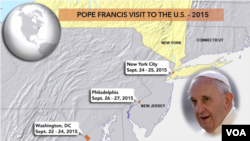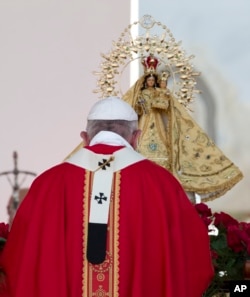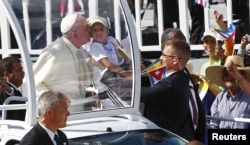Pope Francis headed for the United States Tuesday, shortly after celebrating a third and final Mass in the Caribbean island nation in which he urged Cubans to rediscover their Catholic heritage and live a “revolution of tenderness."
Francis spoke at a Mass at the Basilica of the Virgin of Charity of El Cobre, the country's holiest shrine, with President Raul Castro attending.
The pope's homily in a country whose 1959 revolution installed an atheist, communist government that sought to replace the church as a guiding force in people's lives was the latest in a series of carefully worded critiques of the Cuban system during his four-day trip.
During a visit to the shrine Monday, the pope prayed for reconciliation among all Cubans, both at home and around the world.
Previous sermons
Earlier Monday before departing for Santiago, Francis celebrated Mass in the eastern city of Holguin, telling tens of thousands of people to heed Jesus' invitation to overcome resistance to change.
And during his Sunday Mass in Havana, Francis urged thousands of Cubans to serve one another and not an ideology.
He encouraged them to refrain from "looking to one side or the other to see what our neighbor is doing or not doing," words that resonated in a nation where the government controls most aspects of life.
Since arriving in the country Saturday afternoon, Francis has had a packed schedule, visiting three cities, celebrating three masses, performing various blessings and prayer services, shaking countless hands with adoring crowds, and meeting with both Fidel and Raul Castro, the brothers who have ruled the country since 1959.
The pope appeared to be moving in discomfort during the Mass Tuesday; Francis, 78, suffers from a bad knee and a condition called sciatica, which causes intense pain in the lower back and down the leg.
The pope left Tuesday for the U.S. about 12:30 p.m. EDT (1630 GMT). He will arrive at Andrews Air Force Base outside Washington around 4 p.m. EDT (2000 GMT), where he will be met by President Barack Obama and his wife, Michelle Obama, as well as Vice President Joe Biden and his wife, Jill.
Francis' U.S. schedule includes a private meeting with Obama, speaking to a joint session of Congress, and addressing the U.N. General Assembly in New York as well as celebrating an outdoor mass in Philadelphia, at which nearly 2 million people are expected.
The pope, born Jorge Mario Bergoglio in Buenos Aires, Argentina, enjoys broad popularity in the U.S. -- 66 percent of Americans approve of him, according to one recent poll, compared to 80 percent of Cubans, in a separate poll.
During his visit to Cuba, the pope has refrained from chastising the communist regime for its crackdowns on dissidents and curbs on civil liberties.
He is expected to be more provocative in the United States as he addresses Congress Thursday and the United Nations Friday.
His topics are expected to include critiques of the dominance of finance and technology; a condemnation of world powers over the conflicts gripping the planet; appeals to protect and welcome immigrants; and climate change.
Francis and Vatican officials were the force behind months of secret talks between Havana and Washington in 2014.
The talks climaxed with last year's announcements by Raul Castro and Obama to reestablish diplomatic ties for the first time in 53 years. They have since opened embassies in Washington and Havana.
Vatican spokesman the Rev. Federico Lombardi said Monday that the pope's trip was aimed partly at encouraging progress in the continuing effort to normalize U.S.-Cuba ties.
Some material for this report came from Reuters, AFP and AP.








